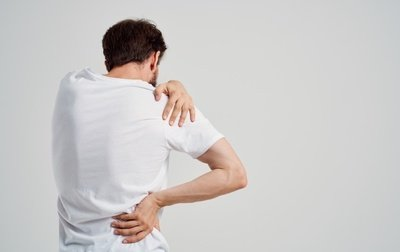How to Relieve Back Pain with Prostatitis in Daily Life?
Date:2022-07-26 click:0
Prostatitis can cause back pain. The prostate wraps around the proximal urethra under the bladder and is low in position. But the prostate itself has a capsule that can irritate nerves in the capsule when the prostate becomes inflamed. The nerves on the capsule can be distributed in various parts of the human body, from the pelvis to the waist up.
Therefore, if the capsule is stimulated, nerve pain symptoms will cause perineal, perianal, inner thigh, and lower back pain, and it may even cause the lower abdomen to radiate to the inner thigh and buttocks.

Therefore, after prostatitis stimulates the prostate capsule, the symptoms caused by the stimulation of the nerves are various, and the pain sites are also diverse. Therefore, prostatitis can cause back pain, but it is not necessarily caused by prostatitis. It is necessary to find a doctor for further diagnosis to see if there are other reasons for the back pain.
Therefore, if back pain occurs, do an ultrasound examination of the urinary system to exclude stones. In addition, low back pain can also be seen in lumbar muscle strain and lumbar vertebra disease. It is necessary to carry out relevant examinations to exclude it before it can be diagnosed as low back pain caused by prostatitis.
In addition, prostatitis can cause urination discomfort and pain symptoms, and patients with prostatitis also experience pain and discomfort in the scrotum, lower abdomen, and perineum. If the pain is severe, it may radiate to the groin area and may also radiate to the waist and belly so that it will cause low back pain. Once the symptoms of low back pain appear, the symptoms of prostatitis are more serious. Therefore, active treatment of prostatitis is required.
Men who have prostatitis must be treated as soon as possible. Otherwise, it will cause physical discomfort and affect male sexual function. Prostatitis can cause back pain, which can be treated with drugs, surgery, and massage. Next, I will introduce how to treat low back pain caused by prostatitis.
1. Systemic antibiotic therapy: Systemic antibiotic therapy can treat symptoms such as frequent urination, urgency, urgency, and low back pain caused by prostatitis. However, if the patient's prostate has been blocked and calcified, the drug cannot enter the prostate. It is not effective, and other methods of treatment are required.
2. Medication: Diuretic and Anti-inflammatory Pill is a good choice for patients with diagnosed prostatitis. It has the main functions of clearing away heat and detoxifying, promoting blood circulation, promoting qi and relieving pain, and diuretic and dredging stranguria. It is also anti-proliferative, anti-fibrotic, and anti-calcifying. From the clinical point of view, Diuretic and Anti-inflammatory Pill can eliminate low back pain and other symptoms to cure prostatitis.
3. Massage therapy: If prostatitis patients feel low back pain, self-massage and passive massage can be used to relieve symptoms. Self-massage is to master some massage methods to relieve prostate symptoms and massage yourself. Passive massage is the patient doing massage from others, also known as power-assisted massage. Massage therapy can act on the muscles of the affected area, promote blood circulation in the affected area, accelerate the patient's metabolic function, and relieve the symptoms of low back pain caused by prostatitis.
4. Single physical therapy such as microwave and radio frequency: These physical therapies can use the thermal effect generated by physical means to promote the blood circulation of the prostate tissue and speed up the metabolism. It can reduce inflammation, eliminate tissue edema, and relieve the patient's muscle spasms. It can treat a series of physical symptoms caused by prostatitis.
5. Daily conditioning: Prostatitis patients should do good personal hygiene, overcome bad sexual habits, moderate sexual life, not interrupt sexual intercourse or frequent masturbation, and usually do not sit for long periods. Patients must adjust their lifestyle in daily life, avoid overwork, and not eat spicy and irritating food. Patients should participate in physical exercise to enhance physical resistance actively.
You may also be interested in:



